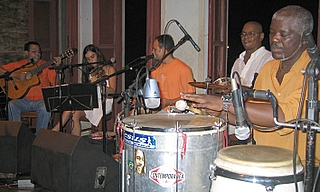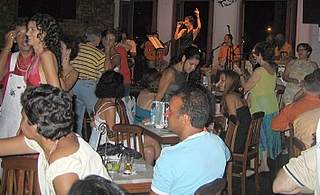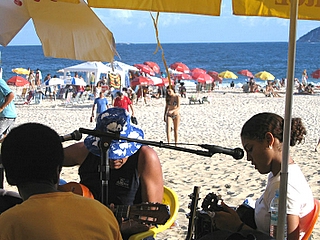After four years back in London, the Beetle is scuttling to
pastures new. She will continue to be involved with the
Globetrotter e-newsletter, so please keep your stories, anecdotes
and comments coming!
“Why, Sir, you find no man, at all intellectual, who is
willing to leave London. No, Sir, when a man is tired
of London, he is tired of life; for there is in
London all that life can afford.” – Samuel
Johnson
I've lived longer in London than any other place. I love
London; if based in the UK, it's the only place I'd chose
to live, but…you knew there was a 'but'
coming…..like any large city, it has its downsides. On the
plus side, I like London for its cosmopolitan mix of people and all
that they bring with them. So, for example, one of my favourite
restaurants is the Ethiopian restaurant, Merkato on Cally
Rd.
I like London's tolerance for dress and eccentricity – if you
want to have a pink Mohican, well fine, no-one is going to stop and
stare, if you want to have 1000 piercings or walk down the road
holding hands with the same sex – nobody minds, or is it more a
question that nobody cares? One day whilst walking in the City, I
almost bumped into a very tall man with 3 day stubble, blue eye
shadow, pink lipstick, wearing a Laura Ashley print dress and Doc
Martin boots, and he had amazingly hairy legs! I like the tolerance
of however you want to present yourself goes, it's not frowned
up to stand out. I like it that we have a live and let live
attitude, so no matter what your personal, sexual or religious
preferences are, that's fine in London.
I guess I like the diversity of people and backgrounds London
offers and all the activities available. If you want to learn
tango, go to origami classes, learn car maintenance or Japanese or
dress making, there's always a class for you. The night life is
good too, ranging from the sort of full on clubs you'd see in
any big city to individual hang outs, great wine bars, coffee shops
– there's something for everyone – at a price.
Most British people take our heritage completely for granted. I
have to confess, I lived 3 minutes walk from St Paul's
cathedral, but I've never been in it – I objected to the
outrageous entry fee. I could have attended a service, but I
didn't. I went to the Tower of London as a child, but not
since. One job I had involved working in a John Nash designed
building and walking past the Royal National Opera House and St
Martins in the Fields on my way to work. I admit, I used to look up
and think how lucky I was, but I have only been to the opera twice,
though I use the café in the crypt at St Martins in the Field on
the odd occasion, but both are very expensive. I like the theatre
very much, and there are ways of obtaining reasonably priced
tickets, but if you want to go and see a movie in the West End,
it'll set you back around £10. The cinemas at the Barbican are
my favourite, because you can choose where to sit, it's not
quite so expensive and people are generally better behaved – and
this is the key to my leaving London.
In London, there is a two tier system of activities and places to
go. There are the places that tourists go, like Oxford St, Covent
Garden and all of the shops, bars and restaurants around there that
no self-respecting Londoner would admit to going to. They are
usually too expensive, too loud, too busy and of embarrassing
quality; you really have to know where to go, and if you are new to
London, this takes time to build up. For me, and I am not a native
Londoner, part of the fun in London is discovering new haunts and
hang outs. Building this knowledge can be frustrating too. It took
me years to find a decent plumber, electrician and painter, and
still not found a good builder.
I find London expensive, and I live here, so I imagine that
visitors must feel the same. I also think it often offers very poor
value for money, ranging from the tourist trap restaurants to
historic site entrance fees. Having lived and worked in the US,
Germany, Switzerland, Cayman to name but a few places, I don't
think we have a very good service culture here in the UK, in shops
restaurants and other services. The costs of renting, and even
buying a place in Central London are often prohibitive. Bus fares
are outrageous – £1.20 a journey and usually take twice the time of
a crowded tube in London's traffic. A tube journey costs a
minimum now of £2.20 – just avoid rush hour if you can, tube travel
is becoming unbearable. Weekly passes are better value, but still
expensive. Londoners regularly complain about London transport, but
I think we are lucky in having a good network of buses, tubes and
trains, even if they are often unpleasantly crowded, smelly, dirty,
expensive, slow and late – you try using public transport outside
London, in rural areas in the UK, it is almost non existent. Mind
you, when I compare the attitude of New York City subway kiosk
attendants to the London Underground counter attendants, London
wins, hands down for not being as rude and as unhelpful as their
NYC counterparts. I won't even bother to discuss driving in
London, with congestion zone charges, cameras, lack pf parking,
astronomical parking charges and over zealous ticket toting traffic
wardens.
Whilst I like the live and let live attitude in London about
people's dress and preferences, there are chinks in this when
it comes to public behaviour. In the past month, I have witnessed
three incidents of bus rage – seriously! The first was a man who
was too late to get on a bus on Upper St in Islington. The bus
driver refused to let him on the bus as he'd pulled away from
the bus stop, so the man walked in front of the bus, arms stretched
out wide and refused to let the bus move on. After 10 minutes of
this and a torrent of the foulest abuse imaginable, and the bus
driver calmly radio-ing “we have a problem”, the man
decided to try and punch in the driver's window, repeatedly
spat at it and then tried to kick in the bus' folding doors.
The passengers and I was one, sat frozen and mute in horror.
Another bus incident involved a woman who was either mad or badly
in need of help and announced that she was going to kill the
vandals responsible for chopping down some tress near where she
lived. She took to accusing the entire downstairs of the crowded
bus and in particular a gaggle of chip eating school girls at the
back of the bus who refused to open the window to let in some fresh
air to dilute the stink of chips they were eating. The mad woman
and the girls then proceeded to engage in a battle of the foulest
language and threats until the mad woman got off. The third
incident just makes for more depressing retelling. And yet, I have
seen Asian youths give up their seat for older people, but no-one
offer their seat on a sweltering and crowded tube for a very
pregnant woman. I offered, she refused, like she expected this kind
of behaviour. But there are good Samaritans: a couple of months
back, I saw a lady trip on the bottom stair of a moving escalator
at Euston and a huge number of people stopped to help pick her up,
dust her down and collect her bags for her. We are not entirely a
capital of monsters, but I do wonder sometimes. When I recounted
these tales to my friends, they shrug and say, well, this is
London.
I could be boring and go on about the weather, the politics, the
dumbing down of our tv, (ironically, the only tv programmes I watch
are from the US – CSI, Law & Order, Futurama and the odd film),
the British press – we have some of the most obnoxious and
intrusive tabloids in the world. We've just had a general
election, though you wouldn't know it. Our political apathy is
maybe based on the pathetic characters available for election.
What's that Dr Johnson said?

 The gentle
sound of Guitars drifting across the tropical air whether it be in
the market square in the borough of Laranjeiras or by the beach in
Ipanema, introduced me to the sound called “Chorinho” –
The crying or weeping of guitars. The music started about the turn of the 20th century and like jazz is free flowing and improvised. The lead instrument is called a
“Cavaquinho”, a small guitar and the music is always
instrumental in form, but many times has a flute or Sax amongst the
various guitars. The undulating but easy listening rhythm is
controlled by the guitars and usually one tambourine.
“Chorinho” fell out of fashion for a time but seems to be
making a come back, especially on Saturday mornings around the
town, where the musicians gather quite a crowd.
The gentle
sound of Guitars drifting across the tropical air whether it be in
the market square in the borough of Laranjeiras or by the beach in
Ipanema, introduced me to the sound called “Chorinho” –
The crying or weeping of guitars. The music started about the turn of the 20th century and like jazz is free flowing and improvised. The lead instrument is called a
“Cavaquinho”, a small guitar and the music is always
instrumental in form, but many times has a flute or Sax amongst the
various guitars. The undulating but easy listening rhythm is
controlled by the guitars and usually one tambourine.
“Chorinho” fell out of fashion for a time but seems to be
making a come back, especially on Saturday mornings around the
town, where the musicians gather quite a crowd.
 A place not to be missed if you are in Rio is,
“Centro de Cultura do Carioca”. A club or bar in the City
of Rio, near the club land of the district of Lapa, that appeals to
people of all types and ages and has very good Samba, Choarinho,
Popular Brazilian Music and always has a first class group and
singers. 15 R$ (four pounds Sterling) entrance fee and tins of beer
for about 60p each. Caipirinha, a large one costs one pound
fifty.
A place not to be missed if you are in Rio is,
“Centro de Cultura do Carioca”. A club or bar in the City
of Rio, near the club land of the district of Lapa, that appeals to
people of all types and ages and has very good Samba, Choarinho,
Popular Brazilian Music and always has a first class group and
singers. 15 R$ (four pounds Sterling) entrance fee and tins of beer
for about 60p each. Caipirinha, a large one costs one pound
fifty.
 The only tourists, if you could call them that, were
an American Surfing Photographer, who had lived here for four
years, an Argentinean, who had fallen in love, both with Rio and a
girl during Canaval. As the club empted about 3.30 am my friends
and I went to sit by the sea in a district called Leme. A bar
called “Sindicato do Chopp” (Union of the Draft Beers) I
knew it well from a past magazine shoot and there we relaxed and
downed a last drink before that magic hour when the sun rose and my
lovely cool Princess, turned into Sleeping Beauty and I turned back
into a frog.
The only tourists, if you could call them that, were
an American Surfing Photographer, who had lived here for four
years, an Argentinean, who had fallen in love, both with Rio and a
girl during Canaval. As the club empted about 3.30 am my friends
and I went to sit by the sea in a district called Leme. A bar
called “Sindicato do Chopp” (Union of the Draft Beers) I
knew it well from a past magazine shoot and there we relaxed and
downed a last drink before that magic hour when the sun rose and my
lovely cool Princess, turned into Sleeping Beauty and I turned back
into a frog.


 in the north-western corner, one inverted and the
other on its side; according to mythology, placing her this way
caused her to turn herself into stone. Another theory is that
turning her upside down neutralises her powers. There are some huge
fish too in the water whose function is to aerate the water (and
feed on tourists' handouts). There are signs giving details of
classical concerts that take place in the cisterns. The Basilica
Cistern was restored in 1980 for visitors.
in the north-western corner, one inverted and the
other on its side; according to mythology, placing her this way
caused her to turn herself into stone. Another theory is that
turning her upside down neutralises her powers. There are some huge
fish too in the water whose function is to aerate the water (and
feed on tourists' handouts). There are signs giving details of
classical concerts that take place in the cisterns. The Basilica
Cistern was restored in 1980 for visitors.